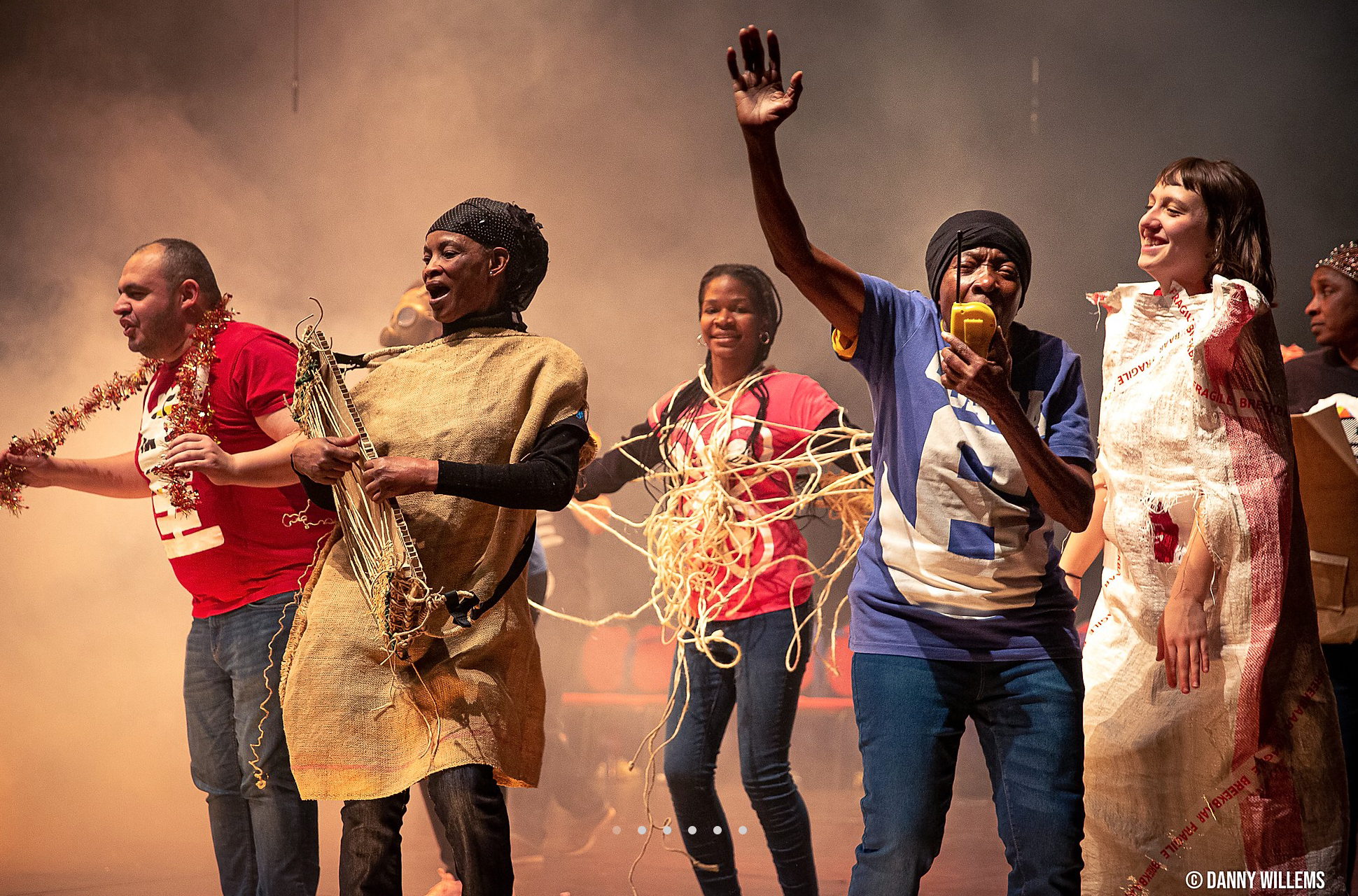Associate Producer Cristina Catalina in Brussels
Cristina Catalina (centre) performing during the Mestizo Arts Festival.
It’s mid afternoon when I arrive at the KVS Theatre in Brussels. I immediately settle at the conversation table and get to grips with people’s names. We’re introducing ourselves and our organisations. This is a result of an invitation from Mestizo Arts Platform to attend their fantastically diverse festival and come together with a group of producers, funders and theatre-makers from across Europe, to share ideas, see work and explore ways in which we can all connect and champion diversity on the continent (even after Brexit…).
I feel the energy and excitement in the room as we learn about each other’s work and marvel at examples of progressive and meaningful collaborations: non-hierarchical structures, active support and development for those voices less heard, bringing together industry players big and small to work together and learn from each other.
Over the next day, we form friendships, debate ideas and are exhilarated by work-in-progress that is thought-provoking, vibrant and eclectic, with pieces by Awoulath Alougbin, Benno Steinegger & Jovial Mbenga, Milo Slayers, Oumar Diallo & Djimi Kahunda Kikonda, and Yipoon Chiem.
Mestizo Arts Platform supports upcoming artists that are developing organically in the urban contexts (growing cities, immigration, digitalisation etc.). These artists mainly have their origin and/or were formed in another country, are self-taught, often working with new art forms and using different references than the Western canon.
In WIPCOOP - Work In Progress Cooperation - MAP created a wide network of (more than 40) organisations (in Antwerp, Brussels, Ghent, Mechlin and more) in which they bring a variety of new artists and new art forms in touch with the regular arts scene. Each year new artists perform a work-in-progress and go into dialogue with people from the arts scene. The main aim is to help the artists with finding collaboration (production, residency space, coaching, programming, prospection) in the professional arts scene. 150 artists have already participated, with many of them now working professionally in the performing arts.
The festival unites all the artistic inroads, sections, side tracks, pathways and offshoots, it is an annual regeneration ritual. With a focus is on innovative artists who are keen to develop their own talent and explore the talent of others, it encourages the development of new ideas, building new repertoires and reflecting on them.
During my time there, the format is a carrousel of works in progress, presentations, and downtime to mingle and discuss ideas, alongside hot drinks and a delicious soup for sustenance. It is chaired with charm and humour by poet Miss Elli, who has in the past performed at one of our very own Dash Cafés in June 2019, Brussels: Whose City is it Anyway?
The energy is in the room is creative, open-minded, full of solidarity and internationals, and I feel at home dropping into conversations in German, Spanish, English, understanding bits of French, meeting people of all colours and creeds. It feels like a true reflection of the globe’s diversity. Pretty much everyone is Brussels is bilingual if not trilingual with English added to their French and Flemish and perhaps another native language, and I see this in full flow at KVS Theatre later on, during Theatre Reconciliation’s touring production of “Vita siyo muchezo ya watoto” (“War Is Not a Child’s Play”).
Actors make a point of translating the text as it’s spoken, with playful interventions and characterisation of the translator’s role, switching between French, Flemish, and Congolese. It is a powerful play with a cast of Congolese, Burundian and Belgian artists, alongside local asylum seekers and refugees, amongst which a formidable 90-year old woman [pictured left].
At the end, we the audience are all invited onstage for a photo opp in protest of the 70% arts cuts by the Belgian government. Struggles we’re not unfamiliar with back home...
Brussels is two hours away on the train, for less than an £80 return. Mestizo are holding various events all year round and it’s REALLY worth going and exploring the rich and exciting work on offer.
With thanks to Mestizo and KVS for the opportunity to attend, and the copy about what they do.


